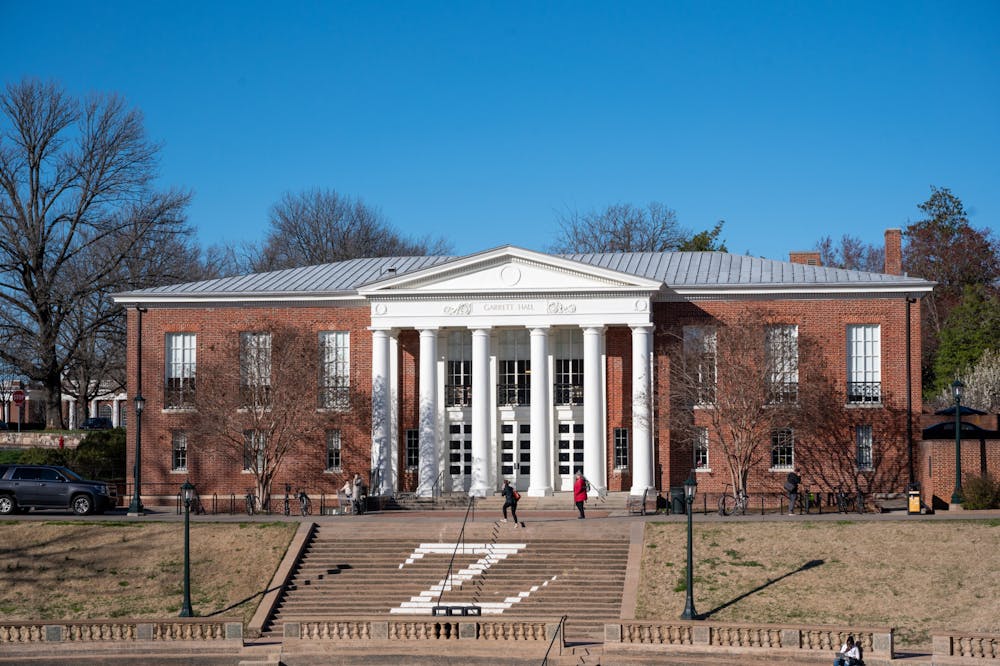The Frank Batten School of Leadership and Public Policy held an event in Garrett Hall Monday as part of their weekly “Batten Hour” series — this week’s talk was titled “The Impact of Political Violence on U.S. Democracy,” with guest speaker and 1991 School of Law alumnus Timothy Heaphy.
Heaphy spoke on the events in Charlottesville in Aug. 2017, where “Unite the Right” protestors marched down the Lawn chanting white supremacist slogans and one counter-protester was killed after a car plowed through a group of counter-protesters downtown. He connected this event to the Jan. 6, 2021 attack on the U.S. Capitol and pointed out several similarities between each event.
Heaphy commented on how these events reveal a core division in American government, and how more people became angry with what they saw in Charlottesville and at the Capitol, resulting in withdrawal from democratic participation. Heaphy offered as a resolution checking our own biases and said that listening to those around us with differing views is crucial.
“Democracy has to be earned, everybody has to continually earn it by paying attention, by critically thinking, challenging your own beliefs and by listening to each other,” Heaphy said.
One similarity that Heaphy pointed out between the two events was how each started as one isolated issue, and then escalated to encompass many other matters which got more people to become involved.
“Charlottesville started out … [as] the discussions about whether or not these two [Confederate] statues were appropriate recognitions of history,” Heaphy said. “Very similarly, January 6 started as about the election … but there were a lot of people in the crowd that were angry about COVID, angry about the government.”
Heaphy, a College and 1991 Law alumnus, played an integral role in investigating both events after each happened. He authored a report in 2017 on the City of Charlottesville’s handling of the rally after the City hired him to review the events, and he also served as the lead investigator for the House Select Committee which inspected the response and inadequate preparation for the Jan. 6 attack.
Heaphy also drew similarities between the roles that social media played, in both cases connecting people with extremist views.
“[Social media] connect[s] you to other people … you’re going to suddenly be asked to join these groups of others that share your interests,” Heaphy said. “They’re essentially free market places where people can post anything, and as a result, misinformation proliferates.”
After the event, Heaphy took questions from the audience of about 80 people, many of which were about the debate on the line between free speech and hate speech. Kristine Nelson, associate director of academic programs at Batten, said that the free speech discussion is what resonated with her as a resident of Charlottesville who had been working at the University during the 2017 rally.
“I think I am continually struck with the challenge … of free speech versus protecting people,” Nelson said.
Batten graduate student Kyle Riopelle stated how these instances of political violence showcased the shortcomings in preparation at each event, and how it is worrisome that the lessons from 2017 were not applied less than four years later in 2021.
“I think the biggest connector between [the events] was my takeaway, which is that this is not a failure of intelligence gathering or having the number of resources, but in accurately assessing the threat and deploying the resources, planning [and] organizing,” Riopelle said. “In some ways, it’s a little concerning that you could have something happen in 2017 in Charlottesville and then not learn from that a few years down the road.”
The next “Batten Hour” event titled “Effective Lawmaking in Virginia: Past, Present and Future” will take place Feb. 5.







